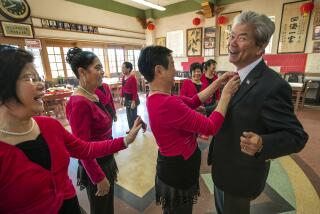Odd Fellows Secret Society Alive in Cuba
- Share via
HAVANA — It may seem strange that a U.S. version of a semi-secret brotherhood founded nearly two centuries ago in Manchester, hub of Britain’s Industrial Revolution, should be alive and thriving in communist-ruled Cuba today.
Odd, too, that it should enjoy cherished status as a legal non-government organization on a Caribbean island whose orthodox one-party rulers outlaw all other political parties and even human rights groups.
But none of this is strange to members of the Grand Lodge of Cuba of the Independent Order of Odd Fellows, the Cuban branch of the semi-secret benevolent society that resembles Freemasonry and claims adherents around the world.
“Fraternity has no frontiers,” the grand master of the Grand Lodge of Cuba, Rafael Renato Gonzalez, told a group of Odd Fellows meeting one evening recently in an upstairs room of an apartment building in central Havana, near Revolution Square.
As electric fans stirred the humid, tropical air, members of the Havana Four Lodge presided over by their Grand Noble solemnly went through the rituals of Odd Fellowship, which traces its roots back to mutual-benefit societies formed by workers during Britain’s 18th-Century Industrial Revolution.
The term “Odd Fellows” comes from the half-admiring, half-disparaging name given to the movement’s founders by other workers in Manchester, who originally shunned the group’s clean-living lifestyle and altruistic creed.
The Independent Order, to which the Cuban Odd Fellows belong, was established in Baltimore in 1819 as a breakaway group from the original order’s British founding fathers.
Renato said Odfelismo, as it is known in Spanish, has several thousand members in Cuba distributed in 115 lodges grouping workers and professionals. Like Freemasonry, also tolerated by the Cuban authorities, outsiders are barred from some meetings and rituals are kept secret.
“We’re not a political party, we’re a fraternity,” Renato said, explaining why the order enjoys legal recognition from Cuba’s Justice Ministry, which authorizes and registers all non-government organizations.
Odd Fellows, who are elected to the fraternity by secret ballot, must obey two basic precepts: belief in a supreme being and a commitment not to discuss either religion or politics during the organization’s business.
This openly apolitical posture is rare in Cuba’s highly regimented society, where workers, farmers, students, women and even neighbors are grouped in mass organizations directly allied to the ruling Communist Party.
The Odd Fellows’ acknowledgement of a supreme being is also at odds with the official Communist Party creed, which espouses “a scientific materialist concept of the universe” expressed in the country’s socialist constitution.
Otherwise, even the most rabidly orthodox communist ideologue could find little to object to in the Odd Fellows’ motto of “Fraternity, Love and Truth,” and their four goals of caring for the sick, burying the dead, educating orphans and providing for widows.
The society is self-financing and has a women’s section, the Rebeccas.
Renato said relations with the communist authorities are good, although he said official “incomprehension” of the society’s aims and objectives has limited recruitment.
The group’s activities are closely monitored by the authorities, however. Each lodge is required to register every new member and every policy decision with the Justice Ministry, which also vets the organization’s constitution.
Odd Fellows who became Communist Party members or teachers at state schools were obliged by the party authorities to relinquish their membership in the society, Renato said.
In contrast, the Odd Fellows’ own ban on discussing religion and politics did not extend to stopping communists and religious believers from joining.
“We’re not interested in what people do in their profane lives,” Renato said.
One factor that might help to account for the Odd Fellows’ survival in a communist system is their patriotism.
A large bust of Jose Marti, Cuba’s 19th-Century independence hero, dominates the inside of the Odd Fellows’ social club on 20 de Mayo street in Havana. The national anthem is sung at each lodge meeting and a Cuban flag stands in the meeting room.
U.S.-Cuban hostility and the absence of diplomatic ties has made it difficult for the Odd Fellows to maintain links with their mother lodge and to receive literature and insignia. But Cuban Odd Fellows have been able to visit the United States. And vice versa.
More to Read
Sign up for Essential California
The most important California stories and recommendations in your inbox every morning.
You may occasionally receive promotional content from the Los Angeles Times.












